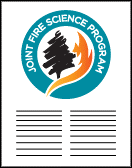United States Joint Fire Science Program

Joint Fire Science Program Research Project Reports
Document Type
Article
Date of this Version
2009
Citation
Project Active ID: 04-S-01
Abstract
The Healthy Forest Restoration Act of 2003 (HFRA) was enacted to reduce wildfire risk to communities and other at-risk lands through a collaborative process of planning, prioritizing and implementing hazardous fuel reduction projects. One of the key features of HFRA is the development of community wildfire protection plans (CWPPs). We studied the development of CWPPs in order to identify those factors and processes that consistently lead to effective collaborative fire and fuels management as defined by HFRA, and enhance local social capacity to sustain wildfire protection activities into the future. Findings from this research highlight the importance of: (1) drawing on local knowledge and skills; (2) building learning communities; (3) accessing networks and involving intermediaries; and (4) building on local capacities and developing new capacities to successful wildfire planning.
Included in
Forest Biology Commons, Forest Management Commons, Natural Resources and Conservation Commons, Natural Resources Management and Policy Commons, Other Environmental Sciences Commons, Other Forestry and Forest Sciences Commons, Sustainability Commons, Wood Science and Pulp, Paper Technology Commons


Comments
U.S. Government Work